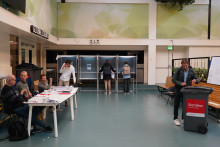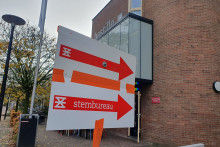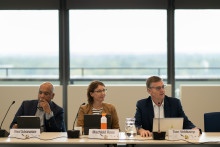D66 matches PVV in the provisional election results, with both parties having 26 seats. It’s hard to imagine D66 not being part of the next government. In that case, PVV would end up in opposition.
VVD experienced a modest setback, losing just two seats. VVD would like to cut spending on education and research even more, but with PVV out of government, that seems highly unlikely.

Provisional results of the parliamentary elections
So what will happen next? D66 is almost certain to form a government with CDA, which also made strong gains yesterday. The main question is which other parties will join them.
Through the centre or to the right?
A broad centrist coalition with GroenLinks-PvdA and VVD would have a majority. Neither of these two parties is likely to jump at the idea, but they might be willing to set aside their differences to form a coalition with D66 and CDA.
Instead of VVD, JA21 plus one smaller party could also make such a centrist coalition with GroenLinks-PvdA possible. That might not be bad news for higher education and research, since JA21 opposed the education cuts.
Or will the next government lean to the right? D66 could also govern with CDA, VVD and JA21. Together they would hold 75 seats. One smaller party - for example ChristenUnie or BBB - could give them a majority. A right-leaning coalition would, however, make policies less progressive than Rob Jetten and his fellow party members would like.
Whatever the final line-up, a D66-led government would be positive news for students and higher education institutions. The exact coalition agreement remains to be seen, but some outcomes can already be predicted.
More student financing
D66 wants to increase the basic student grant by 164 euros per month, at a cost of around 600 million euros. GroenLinks-PvdA supports the idea, but other potential coalition partners see no need for the increase.
Compromises are easy to imagine. They might, for instance, raise only the supplementary grant or only the allowance for students living away from home. It seems unlikely that nothing at all will change in student financing.
…and a mandatory internship allowance
Three parties want to make internship pay compulsory: D66, GroenLinks-PvdA and CDA. This means the chances of such a measure actually being introduced are high.
VVD and JA21 are concerned that small businesses might stop offering internships, but that could be solved - for instance with a dedicated internship fund, which already has broad support in the House of Representatives.
Extra funding for education and research…
D66 wants to allocate more than five billion euros extra to education and research, excluding spending on innovation in the areas of defence, healthcare and business. GroenLinks-PvdA is thinking of three billion, and JA21 has set aside about two billion.
CDA is more cautious: the party’s plans don’t include additional money for education and research. Still, the Christian Democrats are likely to accept that a D66-led government will spend more in this area.
VVD still wants to make cuts, but apparently doesn’t see it as a deal-breaker. In fact, the Rutte IV government actually increased public spending while VVD was the largest governing party.
…but what kind of research?
The precise allocation of research funding will likely be a major point of negotiation. CDA and VVD in particular want to focus first on research that benefits the labour market and society. JA21 shares that view.
D66 and GroenLinks-PvdA are, of course, not opposed to applied research, but they also want to increase funding for fundamental, curiosity-driven research − where researchers decide for themselves what they find interesting.
The likely outcome? More money for applied research at universities of applied sciences seems likely, while research universities may receive extra funding for projects that address societal challenges. Additional funding for fundamental science would then be at risk.
Diversity...
The potential coalition parties have sharply different views on diversity policy. Some think higher education has become too woke, while others want to promote equal opportunities. The most probable outcome: agree to disagree.
In their coalition agreement they will probably avoid sensitive topics such as diversity officers, gender-neutral toilets, prayer rooms or the dismissal of activist lecturers. Those decisions will likely be left to university administrators.
... and protests?
The same applies to the heated protests in higher education over links between research universities - and some universities of applied sciences - and Israeli institutions. Some parties want to take a tougher stance against rioters, while others emphasise the right to protest.
Two outcomes seem likely. Either they leave it to university administrators again, or they make a vague statement such as: we will make agreements with higher education institutions on safety and freedom of protest within their institutions. And then they’ll see how those agreements take shape later.
To sum up...
The cuts proposed by PVV, VVD, NSC and BBB will evaporate. How soon that happens remains to be seen. How much extra money will be made available in the next government term is also still unclear.
... or will the far right seize power after all?
There’s one more possible outcome - unlikely, but still. Suppose CDA changes course and decides to govern with PVV after all; then things could turn out very differently, and D66 would be left out.
PVV might even try to form a majority without CDA, together with VVD, JA21, Forum voor Democratie, BBB, SGP, 50Plus and perhaps one more small party such as ChristenUnie or Partij voor de Dieren. As that seems like a hopeless task, PVV remains on the sidelines for now.






